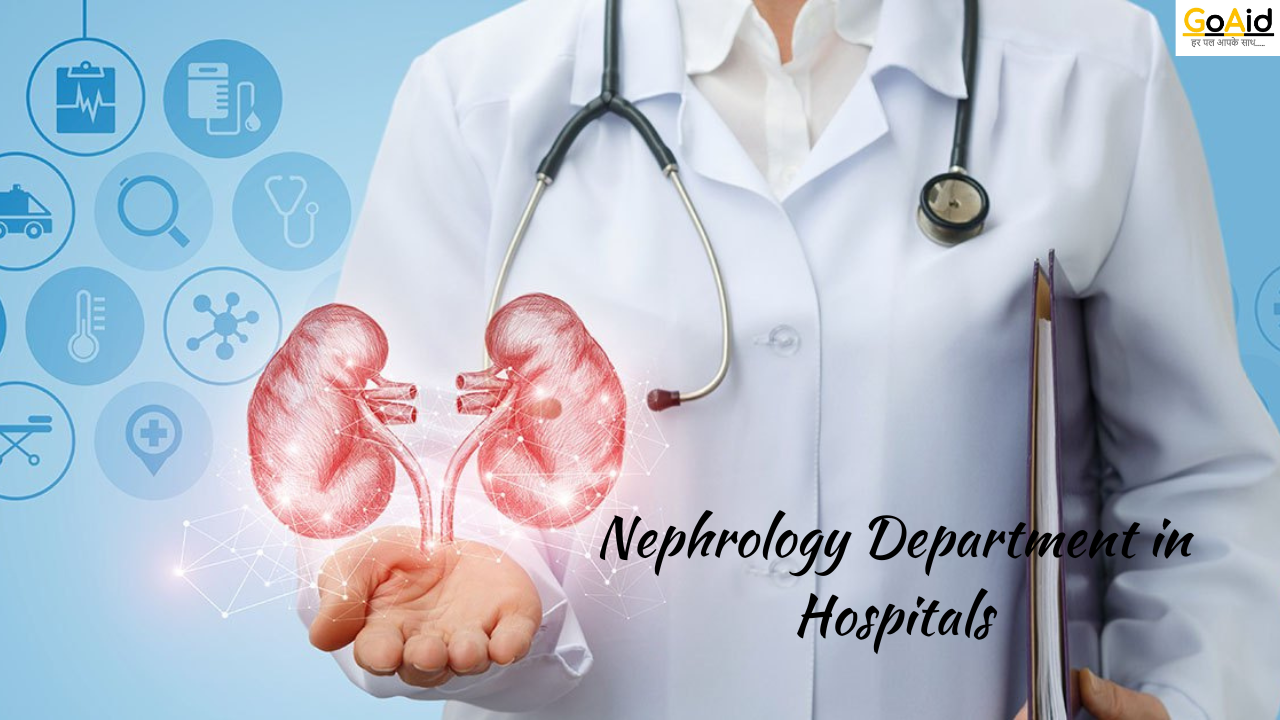The Nephrology Department in Hospitals is something crucial department that can be found more quickly. However, not all hospitals usually have this department but you can find the Nephrology department in any famous hospital in your city. If you have no idea what Nephrology means and what is Nephrology department in Hospitals is, then no need to worry about it! Because we have simplified this educational journey for you.
In this blog, we have added a comprehensive detail about the Nephrology department in the Hospital. We have provided you with details about what the is Nephrology department. Its roles and responsibilities, its features and specialties, treatment provided under the Nephrology department, essential equipment used in this department & also how can you choose the best Nephrology hospitals in India.
So, letŌĆÖs start-
Complete Guide to the Nephrology Department in Hospital
We have added a comprehensive detail about the Nephrology Department in the Hospital in this blog. You wonŌĆÖt need any other source to know about the Nephrology Department in the Hospital after reading this blog entirely.
What is the Nephrology Department in the Hospital? ŌĆō What does Nephrology mean?
The Nephrology department in a hospital specializes in the diagnosis and treatment of kidney-related disorders. We must understand the meaning of Nephrology, as it encompasses various aspects of kidney health, including function, diseases, and treatments.
What does Nephrology mean?
The Department of Nephrology provides essential care for conditions such as chronic kidney disease, acute kidney injury, and hypertension, which can significantly impact overall health.
In the Nephrology department in hospitals, healthcare professionals utilize Nephrology significant tests to assess kidney function and determine appropriate Nephrology treatment options. These tests include blood tests, urine analysis, and imaging studies to accurately diagnose kidney-related issues. The department is equipped with advanced technology and staffed by specialists trained in medical Nephrology, ensuring comprehensive care for patients.
Roles and Responsibilities in Nephrology Department in Hospitals
These are the key roles and responsibilities of the Nephrology department:
1. Patient Assessment
The primary responsibility of the Nephrology department is to conduct thorough assessments of patients presenting with kidney-related issues. This includes reviewing medical histories and performing physical examinations to guide further testing and treatment.
2. Conducting Nephrology Tests
Specialists in the department of Nephrology perform various Nephrology significant tests, such as serum creatinine and glomerular filtration rate (GFR) tests, to evaluate kidney function and diagnose conditions.
3. Developing Treatment Plans
Based on test results, the Nephrology department in hospitals formulates individualized Nephrology treatment plans. These plans may include medication management, dietary modifications, and lifestyle changes to optimize kidney health.
Read More: 7 Most Common Diseases in Summer | Symptoms, Causes, Treatment / Cure ŌĆō A Complete Guide
4. Monitoring Chronic Conditions
The department is responsible for the ongoing management of patients with chronic kidney disease, ensuring regular follow-ups and adjustments to treatment as necessary to prevent disease progression.
5. Coordinating Care with Other Specialists
The Nephrology departments collaborate with other healthcare providers, such as endocrinologists and cardiologists, to ensure comprehensive care for patients with interconnected health issues.
6. Providing Education and Support
Educating patients about kidney health, treatment options, and lifestyle changes is a crucial role of the medical Nephrology team. This empowers patients to take an active role in their care.
7. Performing Dialysis Procedures
The Nephrology ward is equipped to perform dialysis treatments for patients with end-stage renal disease. The team monitors patients during procedures to ensure their safety and comfort.
8. Engaging in Research and Clinical Trials
The Department of Nephrology participates in clinical research to explore new treatments and improve patient outcomes, contributing to advancements in the field of nephrology.
9. Managing Emergency Cases
Nephrologists are trained to handle acute kidney injuries and other urgent situations that require immediate intervention, providing critical care in the hospital Nephrology ward.
Also Read: Dermatology Department in Hospitals
10. Ensuring Equipment Maintenance
Maintaining essential equipment in the Nephrology ward is vital for the accurate diagnosis and treatment of patients. This includes ensuring dialysis machines and laboratory equipment are functioning optimally.
Features and Specialities of the Nephrology Department
These are the key features and specialties of the Nephrology Department in Hospitals:
1. Comprehensive Kidney Care
The Nephrology department offers a wide range of services focused on diagnosing and treating various kidney disorders, from acute kidney injury to chronic kidney disease, ensuring holistic patient care.
2. Advanced Diagnostic Techniques
Equipped with state-of-the-art technology, Nephrology departments utilize advanced diagnostic tools and Nephrology significant tests to assess kidney function accurately, facilitating timely and effective treatment plans.
Also Read: Gastroenterology Department in Hospitals
3. Specialized Medical Team
A multidisciplinary team of nephrologists, nurses, dietitians, and other healthcare professionals works collaboratively within the Department of Nephrology to provide personalized care tailored to individual patient needs.
4. Dialysis Services
The Nephrology ward is equipped to offer both hemodialysis and peritoneal dialysis, providing critical treatment options for patients with end-stage renal disease, along with comprehensive monitoring and support.
5. Management of Coexisting Conditions
The department specializes in managing conditions that affect kidney health, such as hypertension and diabetes, emphasizing a multidisciplinary approach to improve overall patient outcomes.
6. Patient Education Programs
The medical Nephrology team conducts educational sessions to inform patients about kidney health, treatment options, and lifestyle changes, empowering them to actively participate in their care.
7. Research and Clinical Trials
The Nephrology department in hospitals often engages in research activities, providing patients access to innovative treatments and therapies through participation in clinical trials, thus contributing to advancements in nephrology.
Know More: Top 10 Private and Government Hospitals in Kolkata
8. Palliative Care Services
The department provides palliative care for patients with advanced kidney disease, focusing on improving quality of life and managing symptoms to enhance comfort during treatment.
9. Nutritional Support
A vital aspect of care in Nephrology departments is the integration of nutritional support, with dietitians offering tailored dietary plans to help manage kidney disease and promote overall health.
10. Telehealth Services
Increasingly, the Department of Nephrology offers telehealth consultations, allowing patients to receive care remotely, and ensuring access to specialized nephrology services while enhancing convenience and safety.
Know More: Standard Protocols for Paramedics to Follow
What treatment is provided in the Nephrology Department?
This is the list of disorders or conditions that get treated in the Nephrology Department of the Hospitals:
1. Chronic Kidney Disease (CKD)
The Nephrology department specializes in the management of chronic kidney disease, providing ongoing monitoring, dietary counseling, and medication management to slow disease progression and prevent complications.
Read More: Difference Between OPD And IPD: Comprehensive Guide
2. Acute Kidney Injury (AKI)
The department offers treatment for acute kidney injury, focusing on identifying the underlying cause and providing appropriate interventions to restore kidney function, often involving hospitalization and close monitoring.
3. Hypertension
The Department of Nephrology effectively manages hypertension, especially when related to kidney dysfunction. This includes lifestyle modifications and pharmacological treatments to achieve optimal blood pressure control.
4. Diabetic Nephropathy
Patients with diabetes are at risk for kidney damage. The Nephrology departments provide specialized care to manage diabetic nephropathy, including blood sugar control and medications to protect kidney function.
5. Glomerulonephritis
The department treats various forms of glomerulonephritis, which involve inflammation of the kidney’s filtering units. Treatments may include immunosuppressive therapies and supportive care to manage symptoms.
6. Kidney Stones
Patients with kidney stones receive comprehensive treatment in the Nephrology ward, including medication for pain management, dietary modifications, and in some cases, procedures to remove or break down stones.
Also Read: The Essential Role of Emergency Ambulance Services in Public Health
7. End-Stage Renal Disease (ESRD)
The hospital Nephrology ward provides dialysis treatment for patients with end-stage renal disease, offering both hemodialysis and peritoneal dialysis options, along with support for transplant evaluations.
8. Polycystic Kidney Disease (PKD)
The department manages patients with polycystic kidney disease through regular monitoring, treatment of associated complications, and education on lifestyle adjustments to promote kidney health.
9. Kidney Infections (Pyelonephritis)
The Nephrology department addresses kidney infections by prescribing antibiotics and providing care to prevent recurrent infections, which can lead to further kidney damage.
10. Electrolyte Imbalances
The management of electrolyte disorders, such as hyperkalemia and hyponatremia, is a crucial function of the Department of Nephrology. Treatment may involve dietary adjustments, medications, or dialysis to restore balance.
Essential Equipment used in the Nephrology Department
These are the essential equipment used in the Nephrology Department in Hospitals:
1. Dialysis Machines
Dialysis machines are crucial for patients with end-stage renal disease, providing hemodialysis treatments to filter waste and excess fluids from the blood, mimicking kidney function.
2. Ultrasound Machines
Ultrasound machines are used to visualize the kidneys and urinary tract, helping to diagnose conditions such as kidney stones, cysts, or tumors, and guiding procedures like biopsies.
Know More: 108 EMERGENCY AMBULANCE NUMBER
3. Blood Pressure Monitors
Continuous monitoring of blood pressure is essential in the Nephrology department, as hypertension is a common issue in patients with kidney disease. These monitors help track changes and guide treatment.
4. Laboratory Equipment
Essential laboratory equipment, including analyzers for blood and urine tests, enables the Nephrology departments to conduct routine and specialized tests for kidney function assessment and diagnosis.
5. Biopsy Needles
Specialized biopsy needles are used to obtain kidney tissue samples for histopathological examination, helping to diagnose conditions such as glomerulonephritis or renal tumors.
6. Infusion Pumps
Infusion pumps are used to administer medications and fluids to patients, especially during dialysis sessions or hospital stays, ensuring precise dosing and patient safety.
7. Hemodialysis Filters
Hemodialysis filters are integral components of dialysis machines, designed to remove toxins and excess fluids from the blood, providing essential treatment for patients undergoing dialysis.
Read More: Pulmonology Department in Hospitals
8. Electrolyte Analyzers
These analyzers measure levels of electrolytes in the blood, such as potassium and sodium, which are critical for managing conditions related to kidney dysfunction and preventing complications.
9. Portable X-ray Machines
Portable X-ray machines are used within the Nephrology ward to quickly assess kidney size, position, and possible obstructions, facilitating timely diagnosis and treatment decisions.
10. Urinalysis Strips
Urinalysis strips provide a quick and efficient way to assess kidney function and detect abnormalities in urine composition, aiding in the diagnosis of various renal conditions.
How to Choose the Best Nephrology Hospital in India?
You can follow these points as guiding steps to choose the best Nephrology Hospital in India:
1. Research Hospital Reputation
Investigate the reputation of various Nephrology departments by reading patient reviews and testimonials. A well-regarded hospital is likely to provide quality care, ensuring that patients receive effective treatment for their kidney conditions.
2. Check for Accreditation
Look for hospitals accredited by recognized health organizations. Accreditation ensures that the Department of Nephrology meets established standards of care and has the necessary facilities and staff to provide safe and effective treatment.
Know More: The Challenges of Rural Ambulance Services in India
3. Evaluate the Medical Team
Examine the qualifications and experience of nephrologists and healthcare staff in the Nephrology department. Specialists with advanced training and expertise in medical Nephrology are essential for accurate diagnosis and effective management of kidney diseases.
4. Consider Available Services
A comprehensive Nephrology department in hospitals should offer a range of services, including dialysis, kidney transplants, and management of chronic conditions. Ensure the hospital provides the specific treatments you may need.
5. Assess Technology and Equipment
Choose a hospital that utilizes advanced diagnostic and treatment technologies. Modern equipment, such as dialysis machines and imaging tools, is crucial for effective care in the Nephrology departments.
6. Review Patient Care Facilities
Evaluate the patient care facilities available in the Nephrology ward. Comfortable accommodations, supportive staff, and adequate resources contribute to a positive treatment experience, enhancing patient satisfaction during their hospital stay.
7. Check for Multidisciplinary Care
Select hospitals that offer a multidisciplinary approach to care, where nephrologists collaborate with other specialists. This approach ensures comprehensive treatment plans that address all aspects of a patientŌĆÖs health and related conditions.
Also Read: Air Ambulance in India
8. Investigate Post-Treatment Support
Inquire about the hospital’s post-treatment care, including follow-up appointments and support services. Effective post-care is vital for managing ongoing kidney health and ensuring that patients receive necessary assistance after treatment.
9. Verify Insurance Coverage
Confirm whether the Nephrology department accepts your health insurance plan. Understanding financial aspects before treatment can help reduce stress and ensure that you receive the necessary care without unexpected costs.
10. Seek Referrals and Recommendations
Ask primary care physicians or other healthcare professionals for referrals to reputable Nephrology departments. Their insights can guide you to hospitals known for their expertise and quality of care in kidney health.
Book Ambulance: GoAid Ambulance Service
Conclusion to the Nephrology Department
In conclusion, the Nephrology department is a crucial component of the healthcare system, dedicated to diagnosing and treating various kidney-related disorders. Understanding Nephrology’s meaning and the functions of the Department of Nephrology is essential for recognizing its significance in maintaining kidney health. With a focus on conditions such as chronic kidney disease, acute kidney injury, and hypertension, the Nephrology departments offer comprehensive care through advanced diagnostic tools and tailored Nephrology treatment plans. The collaboration among specialists ensures that patients receive holistic support, addressing both their medical needs and quality of life. From essential Nephrology significant tests to innovative treatments, the hospital Nephrology ward is equipped to provide effective care for individuals with kidney issues. Ultimately, the importance of the Nephrology department cannot be overstated. Also, we have provided you with all the details about the Nephrology Department in Hospitals. If you have any questions to ask related to the blog, feel free to write that question in the comment box.
FAQ
Question 1: What is the Nephrology department in hospitals?
Answer: The Nephrology department in hospitals specializes in the diagnosis, treatment, and management of kidney diseases. It covers conditions like chronic kidney disease (CKD), kidney stones, nephritis, and renal failure. Nephrologists in this department focus on preserving kidney function and offering treatments like dialysis and kidney transplants.
Question 2: What does medical nephrology refer to?
Answer: Medical nephrology is a branch of medicine focused on non-surgical management of kidney diseases. This includes the treatment of kidney failure, hypertension, glomerulonephritis, and electrolyte imbalances. Nephrologists often work with patients requiring dialysis or those waiting for a kidney transplant.
Question 3: What is the definition of nephrology?
Answer: Nephrology is the medical field concerned with the study, diagnosis, and treatment of diseases related to the kidneys. This specialty focuses on conditions such as chronic kidney disease (CKD), acute renal failure, kidney stones, and hypertension that affects kidney function.
Question 4: What are the significant tests performed in the Nephrology department?
Answer: In the Nephrology department, significant tests include blood tests for kidney function (e.g., creatinine, urea levels), urinalysis to detect abnormalities, ultrasound imaging for kidney size and structure, and biopsy to diagnose kidney diseases at a cellular level. 24-hour urine collection and glomerular filtration rate (GFR) tests are also performed for diagnosis.
Question 5: What is the treatment provided by the Nephrology department?
Answer: The Nephrology department offers treatments for kidney diseases, including medications for managing blood pressure and diuretics for fluid retention. For severe cases, dialysis is offered to filter waste from the blood when kidneys fail. Kidney transplants are performed for patients with end-stage kidney disease.
Question 6: What happens in the Nephrology department of a hospital?
Answer: In the Nephrology department, patients are evaluated for kidney-related issues. They undergo diagnostic tests like blood work, urinalysis, and ultrasound to determine kidney function. Based on results, treatments such as dialysis, medications, or kidney transplants are recommended to manage or cure kidney diseases.
Question 7: What is the importance of the Nephrology department in hospitals?
Answer: The Nephrology department plays a crucial role in managing kidney diseases, which can lead to life-threatening conditions like kidney failure. By diagnosing early signs of kidney dysfunction, this department helps in preventing progression to severe stages, managing symptoms, and offering dialysis and transplant options when needed.
Question 8: What are the essential equipments in the Nephrology ward?
Answer: The Nephrology ward is equipped with essential tools such as dialysis machines for patients with kidney failure, ultrasound machines for imaging kidneys, blood pressure monitors, and urine analysis kits to assess kidney function. The ward also includes renal biopsy kits and electrolyte analyzers to check kidney health.
Question 9: What is the function of the Nephrology department in a hospital?
Answer: The Nephrology department is responsible for diagnosing and treating kidney diseases. Its primary function is to manage chronic conditions like chronic kidney disease, perform dialysis for patients with renal failure, and offer kidney transplant services. It also provides prevention strategies for people at risk of kidney-related issues, including diabetes and hypertension patients.
Question 10: What does the Nephrology department do for patients?
Answer: The Nephrology department offers comprehensive care for kidney diseases. It provides diagnostic tests to assess kidney function, administers medications to treat kidney-related conditions, and offers dialysis for kidney failure patients. In cases of end-stage renal disease, the department can facilitate kidney transplants to restore normal kidney function.
















